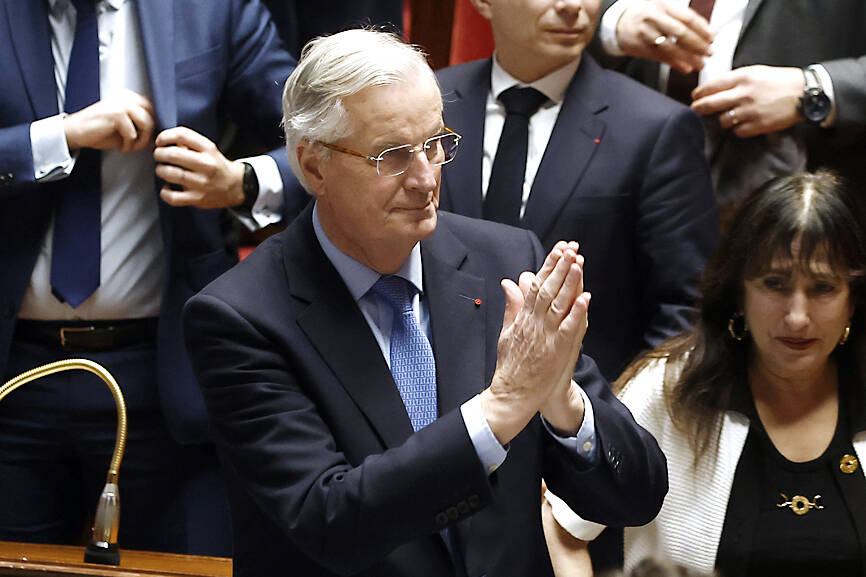French President Emmanuel Macron began looking for another prime minister yesterday after the far right joined forces with the left to push through a no-confidence motion against his government over a budget dispute.
The French president needs to find a prime minister who can pass next year’s budget through a deeply divided parliament, but any new leader would face the same financial squeeze that brought down French Prime Minister Michel Barnier’s administration.
The French president was due to address the nation after press time last night.

Photo: EPA-EFE
The budget bill that sank Barnier’s government contained 60 billion euros (US$63.3 billion) in tax increases and spending cuts that aimed for a reduction in the deficit to 5 percent of economic output next year, from an estimated 6.1 percent this year.
“This budget was toxic for the French,” National Rally leader Marine le Pen said in an interview on French television after she voted to bring down the administration.
Instead, the country needs “a budget that’s acceptable to all,” she said.
The chaos in the EU’s second-biggest economy has prompted bond investors to punish France’s sovereign debt relative to its peers and Barnier had warned of a “storm” in financial markets if he was ousted.
Bonds and the euro were unrattled by the vote, with the 10-year yield ticking lower and the common currency trading little changed. The extra yield investors demand to hold French debt rather than safer German notes declined to 81 basis points.
Barnier, a seasoned conservative and previously the EU’s chief Brexit negotiator, was only appointed in September, making his tenure the shortest for any prime minister since France’s Fifth Republic was founded in 1958. He is also the first French prime minister to lose a no-confidence vote in more than 60 years.
Macron has the authority to appoint a new prime minister, but he had a lengthy struggle before he managed to win limited support for Barnier from a fragmented parliament.
Le Pen said that she is willing to work with another government, so long as they work with her party to draw up the budget.
Macron has said he would not step down until his term ends in 2027 and he cannot be forced out of his job.

The US government has signed defense cooperation agreements with Japan and the Philippines to boost the deterrence capabilities of countries in the first island chain, a report by the National Security Bureau (NSB) showed. The main countries on the first island chain include the two nations and Taiwan. The bureau is to present the report at a meeting of the legislature’s Foreign Affairs and National Defense Committee tomorrow. The US military has deployed Typhon missile systems to Japan’s Yamaguchi Prefecture and Zambales province in the Philippines during their joint military exercises. It has also installed NMESIS anti-ship systems in Japan’s Okinawa

‘WIN-WIN’: The Philippines, and central and eastern European countries are important potential drone cooperation partners, Minister of Foreign Affairs Lin Chia-lung said Minister of Foreign Affairs Lin Chia-lung (林佳龍) in an interview published yesterday confirmed that there are joint ventures between Taiwan and Poland in the drone industry. Lin made the remark in an exclusive interview with the Chinese-language Liberty Times (the Taipei Times’ sister paper). The government-backed Taiwan Excellence Drone International Business Opportunities Alliance and the Polish Chamber of Unmanned Systems on Wednesday last week signed a memorandum of understanding in Poland to develop a “non-China” supply chain for drones and work together on key technologies. Asked if Taiwan prioritized Poland among central and eastern European countries in drone collaboration, Lin

The Chien Feng IV (勁蜂, Mighty Hornet) loitering munition is on track to enter flight tests next month in connection with potential adoption by Taiwanese and US armed forces, a government source said yesterday. The kamikaze drone, which boasts a range of 1,000km, debuted at the Taipei Aerospace and Defense Technology Exhibition in September, the official said on condition of anonymity. The Chungshan Institute of Science and Technology and US-based Kratos Defense jointly developed the platform by leveraging the engine and airframe of the latter’s MQM-178 Firejet target drone, they said. The uncrewed aerial vehicle is designed to utilize an artificial intelligence computer

Renewed border fighting between Thailand and Cambodia showed no signs of abating yesterday, leaving hundreds of thousands of displaced people in both countries living in strained conditions as more flooded into temporary shelters. Reporters on the Thai side of the border heard sounds of outgoing, indirect fire yesterday. About 400,000 people have been evacuated from affected areas in Thailand and about 700 schools closed while fighting was ongoing in four border provinces, said Thai Rear Admiral Surasant Kongsiri, a spokesman for the military. Cambodia evacuated more than 127,000 villagers and closed hundreds of schools, the Thai Ministry of Defense said. Thailand’s military announced that